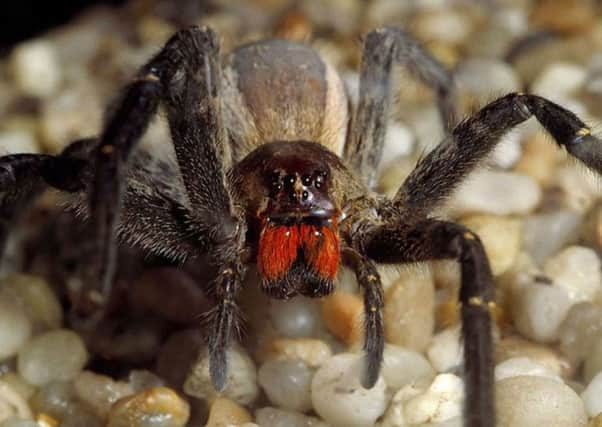UPDATE: Eggs discovered in supermarket bananas found to be harmless after world’s deadliest spider fears


Keith Hobbs and wife Laura called the police when they first opened the bag and uncovered the eggs back at their house.
The bananas had been bought from the Aldi store on the A5 near Hinckley, Leicestershire, which had to close its doors temporarily to the public after the eggs were discovered on Thursday.
Advertisement
Hide AdAdvertisement
Hide AdThe eggs were believed to be from The Brazilian Wandering Spider, classified as the world’s most venomous arachnid.
It is so called because it wanders the jungle floor rather than residing in a web and searches for cover and dark places to hide, and tends to be found in shipments of bananas.
Its venom is 30 times more powerful than that of a rattlesnake and can kill a human in just two hours but can also give male victims a painful four-hour erection.
Now after expert analysis it has been found that the eggs are harmless and not from the Brazilian Wandering Spider.
Advertisement
Hide AdAdvertisement
Hide AdAn Aldi spokesman said: “The safety of our customers is our absolute number one priority and as such, the bananas in question were immediately removed from the store as a precautionary measure.
“Following independent expert analysis, we can confirm that the eggs in question were totally harmless and not from the Brazilian Wandering Spider (Phoneutria fera).
“Whilst our bananas are of the highest quality and delivered by one of the world’s largest suppliers these incidents, whilst extremely rare, can occur and we apologise for the distress caused to Mr Hobbs and his family. The Watling Street Store in Hinckley is now fully open to customers.”
Mr and Mrs Hobbs, with their four children, fled home when told the eggs were probably from the Brazilian wandering spider, which can have legs up to 6in (15cm) long and kill with its venomous bite.
Advertisement
Hide AdAdvertisement
Hide AdThey found the cocoon at their home in Nuneaton, Warwickshire, on Thursday.
Deputy head teacher Mr Hobbs, 32, told The Sun newspaper: “As soon as we knew what they were we just grabbed the kids, who were in their pyjamas, and ran out the house.
“We’ve spent the night in a hotel room. It’s terrifying - it’s like a bad dream.”
Venom from the Brazilian wandering spider can kill a human being in just two hours, with victims suffering nausea, hypothermia and convulsions.
Advertisement
Hide AdAdvertisement
Hide AdDeclared the most venomous spider in the world by the Guinness Book of Records, it is found in South and Central America and its Greek name, Phoneutria, translates as “murderess”.
Rather than building a web to catch its prey, the spider hunts insects, small mammals and reptiles on the jungle floor.